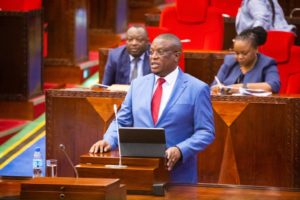Ministry Ready to Drive Digital Revolution and Strengthen Media Freedom - Nape

By Saumu Mwalimu
Dodoma: The Minister for Information, Communication, and Information Technology, Nape Nnauye, has said his Ministry is prepared to ensure that digital revolutions are facilitated by ICT and the information dissemination system is strengthened by overseeing the freedom of the media in the country.
He added that the Ministry is also prepared to finalize the revisions of the 2003 Information and Broadcasting Policy and to develop a strategy for the protection of children against online violence.
Minister Nape made these remarks today, May 16, 2024, while presenting the budget of the Ministry of Information, Communication, and Information Technology (MICIT), where a total of TZS 181 billion has been approved by Parliament for the development activities and the normal expenses of the Ministry for the year 2024/2025.
Stakeholders in the media, including the Media Council of Tanzania (MCT), represented by Acting Program Manager Saumu Mwalimu, witnessed the reading of the budget, which has touched the hearts of media stakeholders in the country.
Other stakeholders who attended the budget reading activities include the Tanzania Editors Forum (TEF), JamiiForums, JOWUTA, Union of Tanzania Press Clubs (UTPC), media outlets, and journalists.
After the budget reading, media stakeholders had the following opinions about the budget. UTPC Executive Director Kenneth Simbaya said this year’s budget is ‘progressive’ and hopeful when considering the plans laid out.
“Comparing it to previous budgets, there are things you see as different in this budget, although there are still things that remain in every budget. I believe, if the plans laid out are implemented, it will help improve the media sector.
“The Minister has repeatedly said that journalists are safe under President Samia Suluhu Hassan. We would not want that safety to be the whim of a leader, but rather through established systems that even if another leader comes, journalists remain safe,” he said.
Simbaya emphasized that the Ministry should continue to consider the private sector, including organizations, as important stakeholders in achieving its goals. “And I urge us as stakeholders, when we see that we can help the government either materially or with ideas, let’s do it, because success is not brought by one person or institution,” Simbaya added.
Veteran journalist and broadcaster Rose Haji said in her history of tracking budgets, this is the first budget that has recognized the importance of media outlets, journalists, in the country.
She said for the Ministry and even MPs to discuss how it can plan and allocate funds for journalists shows the growing value of that profession.
“We have seen Parliament giving due respect to news, media outlets, and even journalists. MPs have discussed the issue of the media economy, for example, several suggestions have emerged urging the Ministry to allocate at least a certain percentage of its budget for the development of media outlets while ensuring the Ministry oversees the payment of debts that have been pending for over seven years,” said Rose Haji.
For his part, Secretary-General of the Tanzania Journalists Union (JOWUTA), Selemani Msuya, said the speech has shown a good direction and advised the need for legal systems to protect the sector rather than relying on the goodwill of the incumbent leader.
“The Minister has outlined how they are prepared to address the challenges facing the media sector, including paying debts and ensuring journalists have employment contracts. This cannot be done by relying solely on the goodwill of President Samia Suluhu Hassan but rather systems need to be put in place,” he said.
He also advised media institutions to collaborate in advocating for the interests of journalists who are facing difficult economic, social, and professional times.
Regarding the issue of freedom of expression as mentioned in the Ministry’s budget, JamiiForums CEO Maxence Mello said the Government is pleased with the Reporters Without Borders report because we have improved rankings, but how did we improve?
“Tanzania was once in the top 97, I think we were even at 65 years ago, now how did we drop to 143? We should not celebrate this 97; it shows we’re not listening to each other. It’s like we’re fighting over sticks while building the same house,” he said.
He emphasized the importance of cooperation between stakeholders within the public sector, civil society organizations, and the private sector in building a broad platform and protecting Article 18 and ensuring freedom of expression is maintained, the media are protected, according to the laws and procedures we have set for ourselves and not those imposed on us
